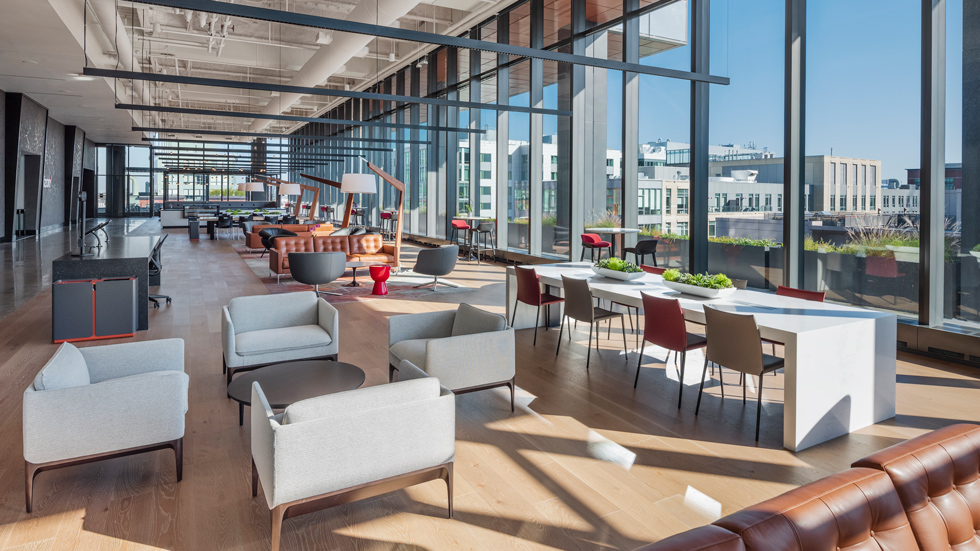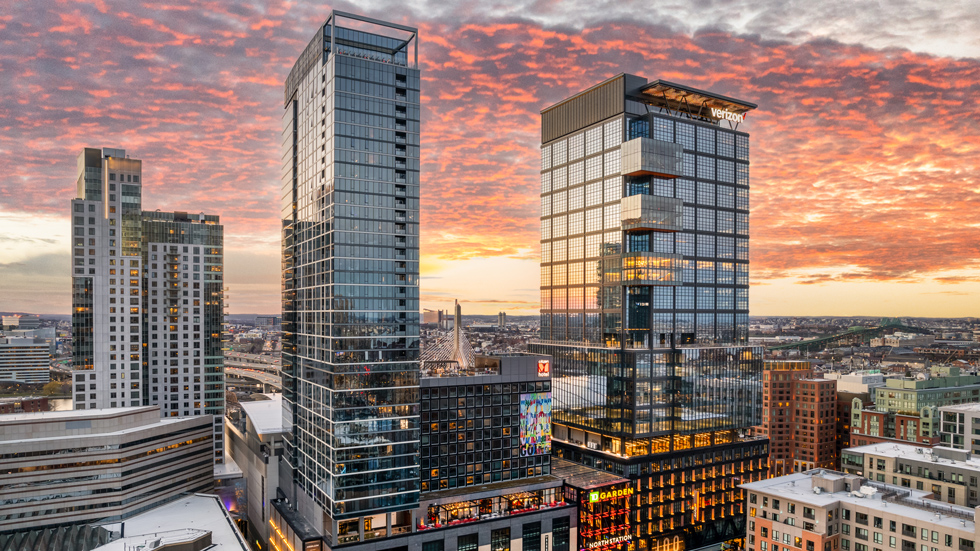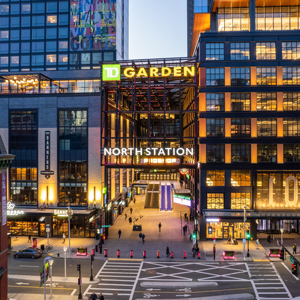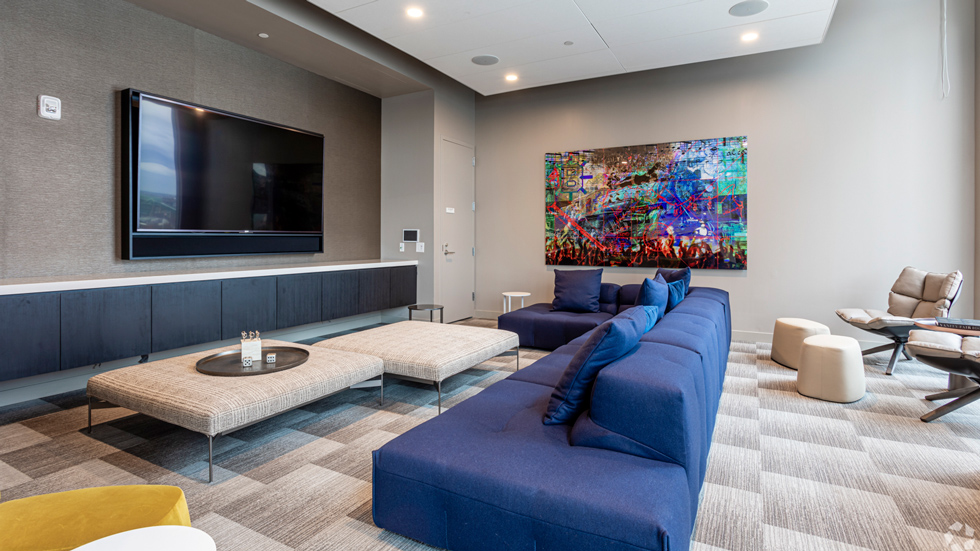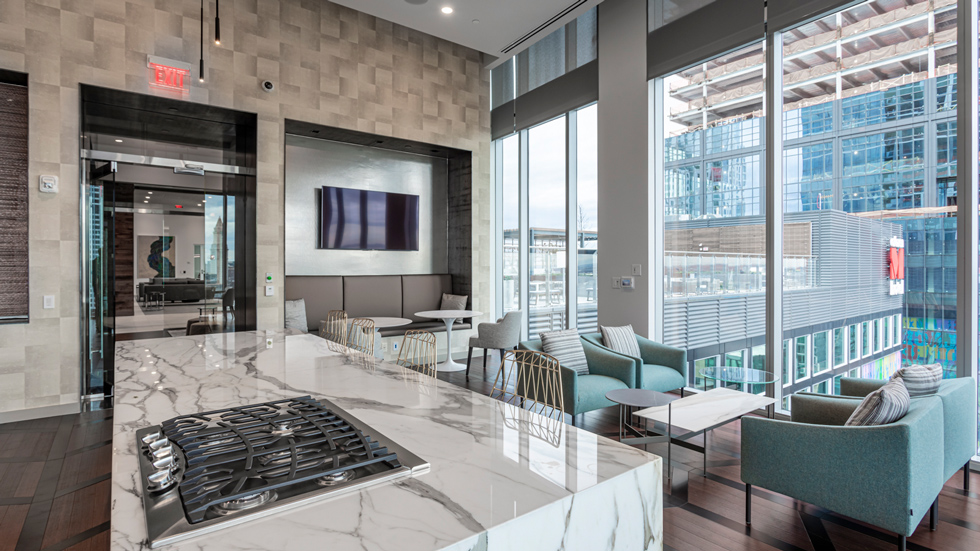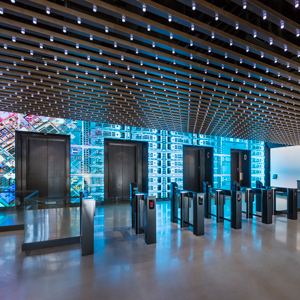Since its opening in 2019, The Hub on Causeway has become one of Boston’s fastest-growing neighborhoods and entertainment destinations thanks to its unique mix of a historical city backdrop and an expanding list of offerings for newcomers and long-time residents.
A joint venture between BXP (NYSE: BXP) and Delaware North, it sits atop the northern gateway to the city of Boston at North Station—a 1.5 million square feet mixed-use development that adjoins the iconic TD Garden arena.
The $1.1 billion BXP development includes 100 Causeway Street, Boston’s first ‘TAMI’ tower designed specifically for tech clients and anchored by Verizon Communications. The complex also includes a 272-key citizenM hotel; a 440-unit luxury residential tower called Hub50House with Boston’s highest rooftop pool; the city’s largest supermarket; 18 eateries in the Hub Hall; entertainment venues and onsite parking.
The Hub bridges some of Boston’s oldest neighborhoods and the culture and history of its iconic sports teams, while finally realizing the full potential of the city’s main transportation corridor.
“This was a zone that was almost like a missing tooth between the famous Italian North End and the West End, a historic neighborhood that became a victim of failed urban renewal,” says Bryan Koop, BXP’s executive vice president for the Boston Region.
“We saw it as an opportunity to connect these neighborhoods and finally synergize them.”
Finding the Next Innovation Hub
Other potential developers had looked at the underutilized Causeway Street site, which historically had been a ghost town on days without TD Garden events, and only envisioned a regional type of retail experience. BXP, meanwhile, had a broader vision.
“We believe that great space and place drives behavior,” says Koop, who more than a decade ago saw the potential in the Boston market for growth in life sciences and TAMI (technology, advertising, media, and information sectors.) Using the then-emerging Meatpacking District in New York as an example of an ideal neighborhood for attracting this workforce due to its neighborhood amenities and access to transportation, Koop and his team searched Boston for a similarly situated area that had the potential for comparable growth.
They found their ideal spot right on Causeway Street situated at the TD Garden, home to the Boston Celtics, Boston Bruins, and touring concert acts. In addition to being Boston’s largest indoor venue, the location was also a transportation crossroads at North Station, which connects 64% of public transit trains in Massachusetts.
For close to a decade, BXP partnered with the city’s Boston Planning & Development Agency (BPDA), formerly known as the Boston Redevelopment Authority (BRA) over the course of two different mayoral administrations, to make the project a reality.
“Both mayors were incredibly supportive of the project because they saw the potential for building a sustainable transportation hub property and putting density in a place where all the transportation was,” Koop says
They also worked with the Downtown North Association (DNA), a nonprofit coalition representing the business, institutional, professional, hospitality, and residential interests in the North Station area and the West End. The purpose of the Association is to “encourage and contribute to the continued economic, social, and physical revitalization and redevelopment of the Downtown North/ West End community as a whole.”
In 2018, BXP found its tech anchor when Verizon signed a 20-year lease to anchor the new tower at 100 Causeway St. with 440,000 square feet accommodating up to 3,000 employees of the telecommunications firm.
The tech tower and accompanying amenities also attracted Rapid7, a fast-growing cyber security company that provides solutions across cloud security, threat intelligence, vulnerability management, detection, and response. The company leased 147,000-square-feet of The Hub for its new headquarters.
“Our decision to make The Hub on Causeway our Rapid7 home allowed us to create incredible workspace for our colleagues in a truly dynamic location while also having a positive impact on an emerging Boston neighborhood,” says Corey Thomas, CEO of Rapid7.
BXP took their vision for serving the TAMI community further by creating Flex by BXP, a versatile office leasing scheme that provides clients with short-term, modular, plug-and- play space solutions in an open concept environment where work stations can accommodate different businesses.
“We don’t see Flex as a coworking space,” Koop says, “it’s a flexible work space that can be leased on a monthly or yearly basis so it’s a great shock absorber to our larger clients or an incubator for small tech start-ups. It’s proven to be incredibly valuable in this office space market, post pandemic.”
Creating a Vertical Village
Beginning in the late 1950s, the city began a controversial urban renewal program that would ultimately raze the West End neighborhood of Boston and in the process displace 20,000 people from the close-knit community. In developing The Hub on Causeway, BXP and their partners wanted to fill a hole left for decades that followed the demolishment of the historic West End while also respecting the current community’s needs. They worked with the West End Museum and its team to understand that important history.
Meanwhile, a variety of community benefits were provided as part of the development. BXP and its partners at Delaware North accelerated payments due for affordable hous - ing in order to assist in the development of The Beverly, an income-restricted residential development in the neighborhood. BXP partnered with the City of Boston and agreed to fund the investment before making the decision to move forward with the construction of Hub50House.
In designing The Hub, BXP included a Community Room in its East & West Podium area in order to provide meeting space for neighborhood groups and non-profits, like the local historic group and other community meetings. The room is fully-adaptable with audio visual equipment, mobile furniture, and plans for a local artist-designed mural inside.
Part of bridging two historic Boston neighborhoods, West End and the North End, included bringing in a basic amenity that had been missing from the neighborhood for decades. In 2019, The Hub opened the largest Star Market grocery store in Boston after years of community demand.
BXP worked with The Grocery Store Committee, also known as North End/West End/ Beacon Hill Super - market Committee, a group of neighbors and citizens who advocated for 20 years for an accessible, affordable grocery store in the food desert neighbor - hood. The committee worked tirelessly to bring a new supermarket into the area around the West End, North End, and Beacon Hill neighborhoods, but the spaces that were available never had the right square footage and layouts for a traditional market, as well as the space to accommodate shipment unloading.
“This neighborhood, which was growing leaps and bounds in population and deserved the same thing that any residential community in the suburbs would have in Boston,” says Koop, who says he was inspired by the Grocery Store Committee’s dedication. “We went after this vision and made sure we got the best in Star Market, which is home grown originally out of Boston.
Using an innovative design that allows the market to have a small footprint in high traffic areas at street level where commuters are moving through North Station and fans are attending events at the TD Garden, the 60,000- plus square foot store utilizes underground space that is also accessible directly from the parking garage. The project took years of expert engineering designs to accommodate the unique space in The Hub complex and maximize the potential of the store.
The Grocery Store Committee embraced the partnership, welcoming the accessible design that better accommodates families who would want to live in the neighborhood, but previously would have found it challenging due to the lack of a basic necessity. To celebrate the partnership, the Grocery Committee sat in on the official signing of the lease by Star Market and BXP, and committee members were also invited to sign the lease themselves as a gesture of their years of advocacy for the community to bring about this project.
“This store wouldn’t exist if it weren’t for the Grocery Committee,” Koop says.
Activating Entertainment
Koop recalls that one of the initial draws of the location was the rich history surrounding the TD Garden and the city’s sports teams. The original Boston Garden was built in 1928 and demolished in 1998, after the new venue was built next door, but for 20 years the original land sat vacant despite all of its potential.
BXP chose global architecture firm Gensler to design the mixed-use development comprising the office tower, residential tower, and retail gallery connecting North Station and TD Garden.
They utilized sustainable, modern design elements with steel and glass but also made sure the architecture helped connect the neighborhood with its industrial past.
“We wanted to create the most sustainable three acres in Boston,” Koop says, with components such as the office tower LEED-certified platinum. “Its carbon footprint is also fantastic because of this transportation hub.”
TD Garden had long lacked a central entrance; instead, patrons and commuters were forced to enter and exit through smaller traditional doorways that often led to confusing long lines and pedestrian back-ups. The Hub now welcomes patrons with a larger grand entryway that allows easier access to transportation and the TD Garden. Visitors can easily visualize the new offerings like Hub Hall, a food and drink hall with 18 different vendors and spend time in the neighborhood outside of Garden events.
BXP partnered with local entertainment guru and Boston native, Ed Kane, to further activate the entertainment possibilities of the area. Kane is principal of Big Night Entertainment, a Boston-based full service, hospitality and entertainment company with 23 locations ranging from nightclubs, restaurants, and music halls, to bowling alleys.
In 2019, Kane opened Big Night Live, a 2000-person music hall and event space with Tequila Cocina, a restaurant concept by celebrity chef Guy Fieri. The venue employs more than 200 people and hosts roughly 250 shows a year, many of them sold-out, further bringing business to the new and surrounding retail. Kane says the additional convenience of having a boutique hotel like citizenM Hotel onsite (located on top of North Station) helps accommodate the top talent playing at Big Night Live, as well as the fans coming to town for the shows
“BXP was so fantastic to work with—they’re thoughtful and creative. You always get the sense that it is a true partnership,” Kane says, “so in this case we worked together to think about what would bring the best value to the neighborhood.”
For Kane, who grew up in the Dorchester area of Boston and attended sports events at the original Boston Garden, The Hub is a homecoming for the neighborhood. Kane sees The Hub as more than just a place for visitors coming for the sporting events.
“Finally, this is a neighborhood again. This is a place to go. The Hub brought everything together,” says Kane.
According to Koop, that’s one of the reasons The Hub is a perfect example of BXP’s broader approach to development. Thoughtful placemaking benefits both clients and communities.
“The business we’re in is not real estate,” Koop says. “We are in the business of creating great spaces with the best amenities and connectivity that power progress for our clients.
